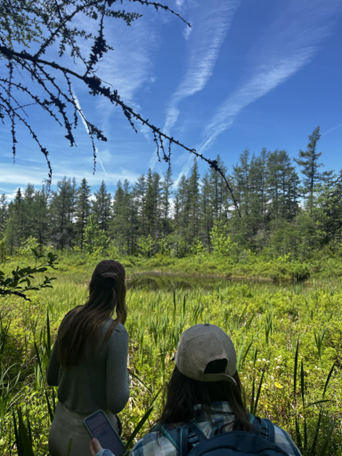Written by Alicia Higney – Equipment & Training Coordinator
We’re reflecting on some of the fantastic work our community partners have accomplished to kick off this field season. I had the pleasure of joining a few of our partners in the field to learn more about their ongoing projects. I hope to join more of you throughout the season and share your wonderful goals and aspirations with our community!
Helping Nature Heal Shoreline Restoration on Lake Banook
Helping Nature Heal is an ecological landscaping company that crafts beautiful, sustainable outdoor spaces. By blending ecosystem science, landscape design, and ecological restoration, they create harmonious relationships between urban spaces and environmental needs. Helping Nature Heal workshops take a community-based approach that really resonates with us.
I had the privilege of joining Helping Nature Heal at Birch Cove Beach in Dartmouth for their Shore Up Workshop, where I witnessed firsthand the power of community-based conservation. The sun was shining bright and warm, and it was inspiring to see more than 25 community members come out to lend a hand in restoring the shoreline. The geese were very curious and watched as we planted willows, yarrow, raspberries, and other native plants along their shoreline. The Shore Up Workshop was an incredible collaboration between Helping Nature Heal, Ecology Action Centre, and the City of Halifax that aimed to naturalize the Birch Cove Beach shoreline and divert wildlife (and their poop!) from recreational swimming areas, providing a buffer that will enhance and protect water quality on Lake Banook for years to come. The hands-on approach taught participants how to use nature-based infrastructure to slow shoreline erosion and create a healthy riparian zone. We spoke to many Birch Cove Park users to share the purpose and importance of the work being done, and it was amazing to look back over the two short days and see the incredible change we had made to the space. Regular water quality testing is done at this site, so we expect and hope to see a positive impact on the swimming area as the summer continues.
Ducks Unlimited Forested Wetlands Protection
Ducks Unlimited Canada (DUC) is a renowned organization dedicated to conserving and restoring wetlands. DUC has been dedicated to preserving wetlands and habitats for waterfowl and other wildlife since 1938. Their mission is to conserve and restore these critical ecosystems, ensuring a healthy future for North America’s waterfowl. The Atlantic Ducks Conservation Team is hard at work this season, assessing habitat characteristics of rare landbird species in forested wetlands.
I joined the Conservation Team in the field to identify and conserve suitable habitats for four threatened land birds in forested wetland ecosystems. Their work focuses on preserving critical habitat for the Canada Warbler, Rusty Blackbird, Common Nighthawk, and Olive-Sided Flycatcher. I spent a day with the team, learning about the unique habitat requirements of these species.
Forested wetlands are particularly at risk because they are often misidentified or overlooked. They are notoriously difficult to restore because it can take thousands of years for the ecosystem to regulate, and the degradation of forested wetlands can leave a mark forever. These ecosystems are quality habitat for four rare land birds of interest to DUC: the Canada Warbler, the Olive-sided Flycatcher, Common Nighthawk, and Rusty Blackbird as well as many other species of flora and fauna. With these species’ habitat needs in mind, we took to the wetlands to assess habitat and identify some prime nesting and breeding areas. The landowners who work with DUC know their properties like the back of their hand, and the DUC team understands the key habitat features of at-risk species. It was incredible to see how these partnerships led to an in-depth understanding of the ecosystems available to rare birds in the area.
Coastal Action Monthly Water Quality Monitoring
Coastal Action is a non-profit organization safeguarding the environment through research, education, and community-driven initiatives. With a focus on the South Shore region of Nova Scotia, they strive to protect and restore ecosystems, promoting a healthier environment for all.
I joined Coastal Action for two days of water quality sampling in both the LaHave and Petite Rivière
watersheds on the South Shore of Nova Scotia. These watershed-scale programs are some of the longest-running community-based water monitoring programs in the province. The LaHave is an important Atlantic salmon river, and the Petite is home to the endangered Atlantic Whitefish. Both watersheds are monitored year-round every month. Along the route, they keep an eye out for invasive species that put these systems at risk, like Hemlock Wooly Adelgid and Smallmouth Bass. This important work helps identify changes in water quality and informs conservation efforts to maintain the only known Atlantic Whitefish population. It was such a treat to see these watersheds from small tributaries to major estuaries with the Coastal Action team!
Our partnerships with these organizations strengthen our collective impact on water conservation. By working together, we can protect habitats, support biodiversity, and build a stronger community. Thank you to our community partners for your ongoing collaboration and support!
